
Family Law Legal Services
Our family law department offers legal advice, representation, and support to clients facing a variety of difficult family law issues. Our main goal is to help clients navigate complex legal processes and achieve fair and equitable outcomes while safeguarding their rights and interests. Talk to our family law solicitor, Aimèe Mulroy, LL.B, LL.M. Call 014537890 or Email info@lawline.ie
Dedicated Family Law Department
Navigating the complex and emotionally charged area of family law can be overwhelming, particularly when separation or divorce is involved. It is advisable to seek professional guidance early, especially when children are affected. Our legal team at Synnott Lawline Family Law is here to answer any questions you may have. We offer practical advice, peace of mind, and timely resolutions for various situations, including Judicial Separation, Divorce, Civil Nullity, Cohabitation Agreements, Separation Agreements for Civil Partners, and any legal issues affecting children. Our goal is to negotiate amicable settlements while avoiding unnecessary adversarial litigation. Contact us today – we are here to help!
Our Family Law Services include: Professional Legal Advice and Guidance
Child Focused Legal Solutions
Book a consultation with a solicitor*
*To schedule a consultation with a solicitor, please note that payment must be made in advance. We offer two consultation options. Once we receive your payment, a solicitor will reach out by phone or email to arrange your appointment. Meetings can be carried out by Phone, Zoom, or In person. We are available to assist you seven days a week.
You can book a 1 hr Consultation @ €200 + VAT or a 15 min Quick Question Consultation @ €50 + VAT.
*There are different Terms in place for Personal Injury and Medical Negligence Claims. Phone 014537890 | Email: info@lawline.ie
Separation Solutions for marriage and long-term civil relationships
Separation Agreements – Legally Binding Contract
If you and your spouse have already agreed upon the broad terms of your separation either during the course of Mediation or by way of mutual discussion and agreement we can put those terms into a legally binding contract called a Deed of Separation or Separation Agreement. Many individuals incorrectly assume that an agreement reached in the context of Mediation is legally binding. In fact this is totally incorrect and it is vitally important that if you have reached agreement in the context of Mediation that you contact a Solicitor with a view to having your Mediation Agreement incorporated into a legally binding contract.
If consensus as to the terms of your separation cannot be reached with your spouse we will represent your interests in a robust yet calm and constructive way. Our family lawyers have a wealth of experience providing excellent legal representation for clients in the context of Judicial Separation proceedings.
Whether your Separation is contentious or non-contentious we will provide you with all of the advice, guidance and legal information you need to ensure that you achieve the best possible outcome to your family law case.
As experienced family law practitioners, we are conscious of the enormous emotional upset caused by the irretrievable breakdown of a marriage. We understand that we are meeting you at probably the most challenging period in your life. By guiding you through the legal issues which arise in the context of the separation process we can make both the practical and legal consequences of separation far less traumatic for you and your family..
Judicial Separation – By Court Order
A Judicial Separation is where the Court makes an Order formally declaring that you and your spouse are no longer legally obliged to live together. The Court then decides upon the actual terms of your separation – this is what is referred to as ‘Ancillary Orders’. The Court will make Ancillary Orders as to Custody and Access arrangements for any dependent children, Orders in relation to what will happen to your family home, Orders in relation to maintenance and any other property and assets including pension policies. The Court may also make an Order in relation to inheritance rights.
Application for Divorce – Court Proceedings
Whether your application for a divorce is contentious or very straightforward court proceedings must issue. It is not possible to obtain a divorce without a Judge formally granting the decree. In deciding whether to make the ancillary orders referred to above the Court must have regard to the following factors:
- The income, earning capacity, property and other financial resources which each spouse has or is likely to have in the foreseeable future;
- The financial needs, obligations and responsibilities which each has or is likely to have in the foreseeable future;
- The standard of living enjoyed by the family before proceedings were instituted or before the separation occurred;
- The ages of each spouse, the duration of the marriage and the length of time the couple lived together;
- Any physical or mental disability of the spouses;
- The accommodation needs of each spouse;
- The effect on the earning capacity of each spouse of the marital responsibility assumed by each while they lived together and the degree to which the future earning capacity of a spouse is impaired for having given up the opportunity of paid employment to look after the home or care for the family;
- The conduct of each of the spouses, if such that the Court considers it would be repugnant to justice to disregard it;
- The contributions which each of the spouses has made or is likely in the foreseeable future to make to the welfare of the family including any contribution made by each to the income, earning capacity, property and financial resources of the other and any contribution by looking after the home or caring for the family;
- The value to each of the spouses of any benefit which the spouse will forfeit;
- The rights of any person other than the spouses but including a person to whom either spouse is remarried;
- The Court must also have regard to the terms of any Deed of Separation or Separation Agreement signed by the spouses.
If either you or your spouse is contemplating an application for divorce please contact our family law department. One of our family law specialists will be happy to discuss your case with you in absolute confidence and will provide guidance and expertise on how best to represent your interests in the context of divorce.
Court Granting Divorce
In order for a Court to grant a divorce it must be satisfied that both spouses have been living apart for a period or periods of at least four years out of the previous five, that there is no prospect of a reconciliation and that proper financial provision exists or is put in place by the Court for the spouses and any dependent members of the family.
Once a Court grants a divorce it means that your marriage to your spouse is dissolved. You are then free to remarry or enter into a civil partnership. Upon granting a decree of divorce the Court will also make Orders as to the actual terms of your divorce – this is what is referred to as ‘Ancillary Orders’. The Court will make Ancillary Orders as to Custody and Access arrangements for any dependent children, Orders in relation to what will happen to your family home, Orders in relation to maintenance and any other property and assets including pension policies. The Court will also make an Order extinguishing inheritance rights.
Civil Nullity
Civil Nullity – Declaration by the Court that the marriage didn’t exist
Civil Nullity should not be confused with applications for Church Annulment which is an entirely separate and distinct matter. A civil nullity decree is a declaration by the Court that although two people went through a marriage ceremony, for very specific legal reasons, their marriage never actually existed in the eyes of the State. There are two types of marriages that may be annulled by the Court – Void Marriages and Voidable Marriages. A Void Marriage is considered never to have existed at all. A Voidable Marriage is considered to have existed until the Nullity has been declared.
Nullity applications are far less common than for example applications for Judicial Separation or Divorce. At Synnott Lawline Solicitors we have particular expertise in successfully representing clients in the context of nullity proceedings.
Court Declaration of Nullity
Court Declaration of Nullity – Inability of one or both parties to enter into and sustain a normal marriage
The Court can make a declaration of Nullity in respect of a marriage where for example:
There is an inability on the part of one or both parties to enter into and sustain a normal marriage relationship (psychiatric illness or disorder).
- The couple were not free to marry because one or both parties to the purported marriage was already married to or in a civil partnership with another person;
- One or both parties was under the age of 18 (and had not been granted an exemption by the Court);
- The couple did not comply with the formal requirements of the State prior to the ceremony (failure to give adequate notice to the Registrar of Marriages);
- One party did not give full, free and informed consent to the marriage (duress or intoxication);
- One party was unable to consummate the marriage;
- There is an inability on the part of one or both parties to enter into and sustain a normal marriage relationship (psychiatric illness or disorder).
Nullity of Civil Partnership
In certain circumstances a Court may make a declaration that a Civil Partnership is null and void. Nullity of a Civil Partnership means that although a couple went through a ceremony of Civil Partnership, no valid civil partnership exists.
The Court may grant Nullity of a Civil Partnership where for example:
- Lack of capacity eg. either or both parties was already married or registered in a relationship with another person which was entitled to be recognised as a civil partnership in the State or either or both persons were under the age of eighteen;
- The couple did not comply with the formal requirements of the State in relation to the registration of civil partnerships (failure to give adequate notice to the Registrar of Marriages);
- One party did not give full, free and informed consent;
- The parties were not of the same sex.
The legal consequences which flow from of a declaration of Nullity in respect of a marriage or civil partnership can have very serious implications for the couple involved. It is therefore of crucial importance that you consult an experienced Solicitor with particular expertise in this niche area of the law.
The Redress Scheme
The Redress Scheme – Qualifying Cohabitant
If you have been living with your partner for a period of two years and have a child together or, if you have no children together but have been living together for five years – then you are what the law terms as a ‘Qualifying Cohabitant.’ This means that, under what is called ‘The Redress Scheme,’ if your relationship with your partner has broken down and you are financially dependent, you may be able to successfully claim compensatory maintenance, the transfer of property and any pensions or you may be able to make a claim against the estate of a deceased cohabitant.
Cohabitation Agreements
Cohabitation Agreements – For couples who are neither married or registered in a civil partnership
We encourage clients who are neither married or registered in a civil partnership and who live with their partners to strongly consider drawing up a Cohabitation Agreement.
The advantage of a Cohabitation Agreement is that it provides certainty for you and your partner as to what financial and property arrangements will apply in the event of the unfortunate breakdown of your relationship. Agreeing these and other practical issues that are important to you and your partner in advance will mean that if your relationship should come to an end the process of moving on with your lives post-relationship will be far less traumatic.
A member of our family law team will provide you with all of the information and guidance you need before entering into a Cohabitation Agreement that is tailored to cover all of the legal issues arising from your relationship together.
Separation Agreement for Civil Partners
Civil Partners – Separation Agreement pending Dissolution
As Civil Partners must wait at least two years before making an application for Dissolution it is a sensible option to enter into a Separation Agreement pending Dissolution. The terms of any such agreement may be reached by the parties themselves, or with the assistance of a mediator or it may be negotiated through the parties’ respective solicitors. A separation agreement will cover all legal issues including: custody and access arrangements for any dependent children, ownership and occupation of the family/shared home, ownership of any other property, maintenance, pensions and succession rights.
If you are a Civil Partner contemplating either separation or dissolution please contact our family law specialist unit for advice and insight into the legal steps involved in either process. We will be happy to provide you with cost effective, competent and experienced legal representation.
Dissolution of Civil Partnerships
Application to Court for a decree of dissolution of a civil partnership
Statistics up to June 2014 indicate that almost 1500 couples in Ireland have entered into civil partnership. Unfortunately, some of these relationships will irretrievably break down and if this is the case either party can apply to Court for a decree of dissolution of their civil partnership. Upon granting the decree of dissolution the Court may also make orders in relation to the payment of maintenance and lump sums, it may order the transfer of property, extinguish succession rights and make pension adjustment orders.
Before a Court can grant a decree of dissolution the parties must have been living apart from one another for a period amounting to two out of the previous three years before the application is made. Likewise proper arrangements must have already been made or will be made for the civil partners before the Court will grant the decree.
Legal Issues Affecting Children
Child-focused legal support for issues such as Guardianship, Custody, Access and Maintenance
As family lawyers we are sensitive to the huge emotional trauma that the breakdown of a family relationship can have on children. How children cope with their parents’ separation and a new family structure depends on various factors including their age/stage of development, gender, personality, and their wider social support structures. Without a doubt however the greatest impact on children in the context of their parents’ relationship breakdown depends primarily on how the adults themselves are coping and how they relate to each other and to their children.
We are very experienced in advising clients over very many years on all legal issues affecting children in the context of relationship breakdown. We can advise you on all child issues including guardianship, custody, access and maintenance. Our approach is child-focused. We encourage our clients to see things from the child’s perspective. We will ask you to consider: ‘what is in the best interests of the child?’ Indeed, that is the approach that the Court will always take when making decisions concerning the welfare of dependent children.
As family lawyers we are sensitive to the huge emotional trauma that the breakdown of a family relationship can have on children. We will be happy to provide you with cost effective, competent and experienced legal representation.
All you need to know – Downloadable factsheets
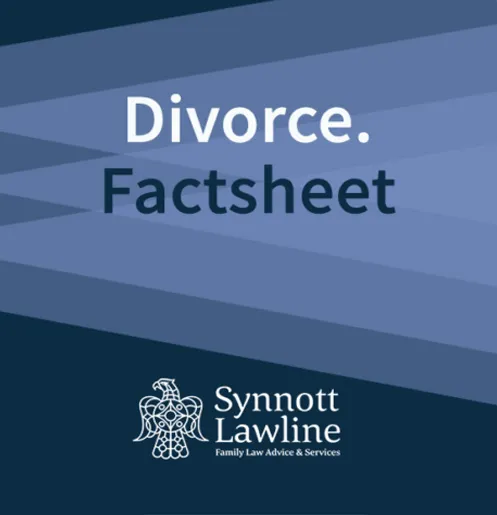
Divorce Factsheet
Once a Court grants a divorce it means that your marriage to your spouse is dissolved.
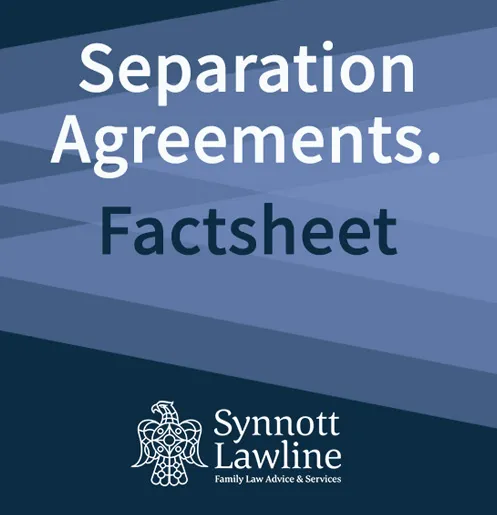
Separation Agreements
Factsheet
If you and your spouse have already agreed you would like to end your relationship, our legal team will guide you through the legal process.
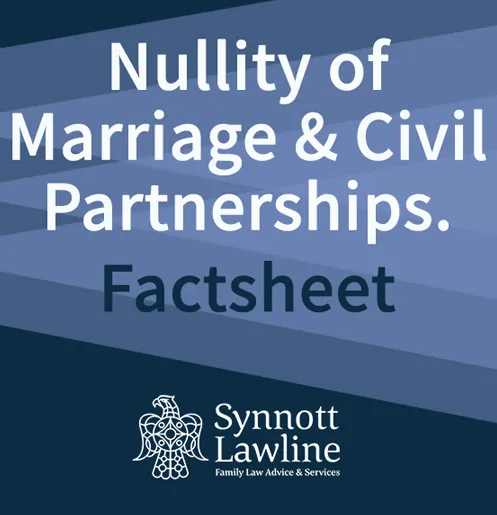
Nullity of Marriage & Civil
Partnerships Factsheet
In certain circumstances a Court may make a declaration that a civil
partnership or marriage is null and void.
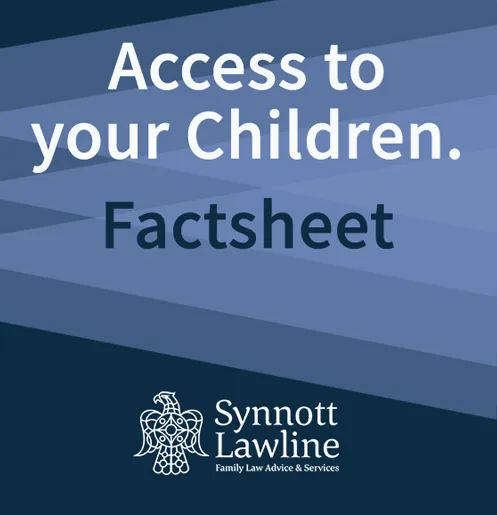
Access to your Children
Factsheet
Access is the right of a child and a parent and/or guardian who do not live together to spend time together.

Domestic Abuse & Barring Orders Factsheet
Domestic violence encompasses the use of physical or emotional force in an intimate relationship.
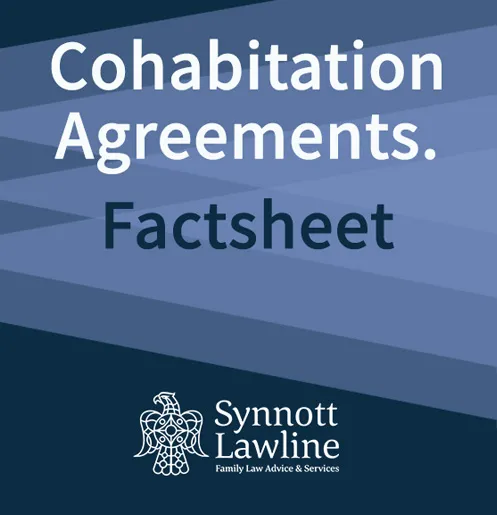
Cohabitation Agreements Factsheet
We encourage clients who are neither married or registered in a civil partnership but live together to strongly consider drawing up a Cohabitation Agreement.
Family Law – Related Articles
Book a consultation with a solicitor*
*A consultation with a solicitor must be prepaid in advance of a phone or office consultation. To book the appointment contact us by phone 014537890, email info@lawline.ie or fill out our contact form and we will contact you to confirm your time, date and arrange payment method.
Synnott Lawline Personal Injury and Medical Negligence Claims
Our firm provides legal assistance to individuals who have suffered injuries due to the negligence or wrongdoing of another party. Our services encompass a wide range of actions, including investigating the circumstances of the accident, gathering evidence for your case, advising you on your legal rights and options, and negotiating with insurance companies to reach a fair settlement. If necessary, we will also represent you in court proceedings if a settlement cannot be achieved. We aim to ensure that your medical expenses, lost income, and compensation for pain and suffering are adequately addressed while navigating the complex legal landscape on your behalf. below is a list of some of our services. If you have a query on starting an injury claim, contact us today, we are her to help.
